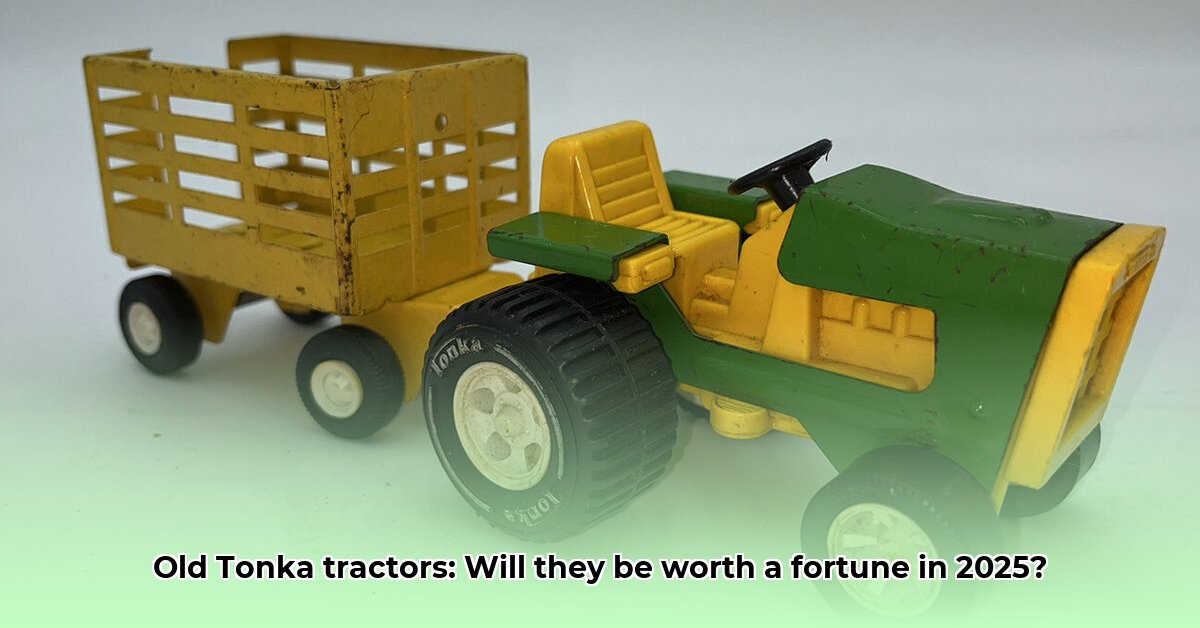
Remember those indestructible Tonka trucks from your childhood? Turns out, some of those beloved toys are now highly sought-after collector's items, with certain models fetching surprisingly high prices. This comprehensive guide will equip you with the knowledge to navigate the exciting world of vintage Tonka tractor collecting, transforming your passion into a potentially profitable venture. We'll cover everything from identifying valuable models to building a thriving collection and preserving your investment for years to come. Are you ready to roll? For more detailed pricing information, check out this helpful guide.
Identifying Valuable Old Tonka Tractors: Unearthing Hidden Gems
Several key factors determine the value of a vintage Tonka tractor. Understanding these factors is crucial to identifying truly valuable pieces. A seemingly ordinary truck could hold surprising worth.
Age: Pre-1961 Tonka tractors are highly prized by collectors due to their classic designs and robust construction, reflecting a bygone era of toy manufacturing. Older doesn't automatically mean more valuable, but it significantly increases the chances of higher value.
Condition: A pristine tractor in excellent condition, with original paint and minimal wear, commands a premium. Significant damage (dents, rust, scratches) drastically reduces value. Think of it like classic cars—meticulous maintenance translates to higher value.
Rarity: Limited editions, promotional models, or tractors with unique features (unusual colors, special branding) are more valuable than common models. The scarcity boosts demand and, consequently, price.
Original Packaging: A Tonka tractor in its original box is significantly more valuable than one without. The box provides authenticity and context, just like a fine piece of jewelry in its original case. A complete box can often double or even triple a truck's value.
Did you know that a pristine, original-boxed Tonka truck can sell for thousands of dollars? This highlights the importance of careful condition assessment.
Grading and Assessing Condition: A Collector's Eye
Accurately assessing a vintage Tonka tractor's condition is critical for determining its value. This isn't an exact science, but a structured approach helps ensure consistency. We've developed a simple grading system to aid in this process.
Paint: Examine the paint for fading, chipping, and scratches. Original paint in excellent condition is highly desirable.
Metal: Check for dents, rust, and structural damage. Metal fatigue can be subtle but significantly impacts value.
Functionality: Do all the wheels turn smoothly? Is the tractor complete and fully functional? A fully operational tractor appeals more to buyers.
Accessories: Are all the original accessories included? These minor details add to a truck's overall value and desirability.
Here's a concise grading system:
| Grade | Condition |
|---|---|
| Excellent | Pristine condition; original paint; minimal to no wear; possibly in original box. |
| Good | Minor paint chips or scratches; generally clean; may show some age-related wear. |
| Fair | Noticeable wear and tear; significant paint loss; possible rust or damage. |
| Poor | Heavily damaged; significant rust; major paint loss; possibly missing parts. |
Remember, these are guidelines; actual values can vary considerably depending on specific model and market demand. Detailed photographs are crucial when buying or selling.
Finding and Acquiring Tonka Tractors: The Hunt Begins
Locating these collectible treasures is half the fun! Here are some effective search strategies:
Online Marketplaces: eBay and Etsy are excellent starting points. Use specific keywords to narrow down your search and increase your chances of finding precisely what you seek. Be patient; finding the perfect tractor takes time.
Auctions & Estate Sales: These venues often unearth unexpected gems. It's a more unpredictable approach, but the potential for great finds is high. Prepare to bid competitively.
Antique Shops & Shows: These brick-and-mortar locations can be surprisingly fruitful. Take your time, examine thoroughly, and let your intuition guide you.
Remember to always inspect a truck thoroughly before buying, comparing prices on similar models to ensure fair pricing. Negotiating is part of the process!
Investing and Building a Collection: A Long-Term Strategy
Building a valuable collection is a strategic endeavor, not mere accumulation.
Budget: Set a realistic budget and stick to it, avoiding impulse purchases.
Research: Thoroughly research different models, their history, and value trends. Knowledge is your competitive advantage.
Patience: Finding the right pieces takes time. A successful collector embraces the long-term perspective.
Diversification: Don't limit yourself to tractors. Expand your collection to include other vintage Tonka vehicles for greater diversity and potential value.
Building a collection is a journey, not a race. The thrill of the hunt adds to the overall experience.
Caring for and Preserving Your Old Tonka Tractors: Protecting Your Investment
Protecting your investment requires careful handling and appropriate storage.
Gentle Cleaning: Use a soft brush and mild soap; avoid harsh chemicals that could damage the paint.
Proper Storage: Store your tractors in a cool, dry place, ideally in their original boxes or protective cases. This minimizes damage from dust and moisture.
Careful Handling: Handle your tractors with care to prevent damage.
Proper preservation safeguards your investment and keeps these iconic toys in pristine condition for generations to come.
Market Trends and Future Value
The market for vintage Tonka toys is dynamic, influenced by nostalgia, the appreciation for quality craftsmanship, and the ever-increasing demand for collectible items. While specific values fluctuate, the enduring appeal of these iconic toys suggests continued growth in their collectible value. Careful research and a long-term perspective are essential for success in this field. Remember that a $1000 sale price for a specific model represents only one data point; the market is broad and varied.
Key Takeaways:
- Tonka tractor value is determined by age, condition, rarity, and original packaging.
- Careful condition assessment is paramount for accurate pricing.
- Research comparable sales before buying or selling.
- Proper care and storage protect your investment.
This guide is intended to provide actionable insights, not financial advice. Conduct thorough research and seek professional advice before making significant investment decisions.